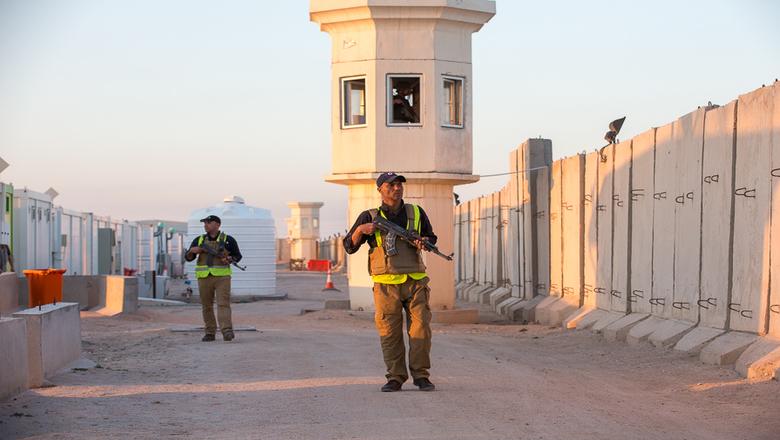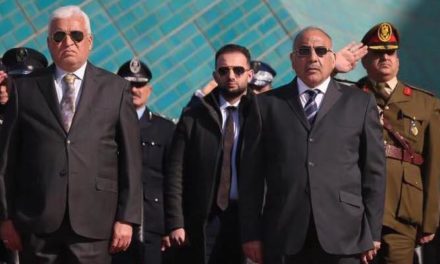The recent escalations between the US and Iran, resulting in the death of the Qasem Suleimani and Abu Mahdi al-Muhandis, was triggered by the killing of an American defense contractor in Northern Iraq in December of 2019.
Defense contractors supporting international military missions is not rare in Iraq and it is no secret that Private Security Companies (PSCs) have played an infamous role in recent Iraqi history, the most well-known of these being Erik Prince’s Blackwater. Following this company’s many unprosecuted crimes that it committed in Iraq, international and Iraqi national law on PSCs has become stricter in an attempt to hold PSCs accountable. On their part, PSCs have given their activities a dimension of “corporate responsibility”. In this article I will investigate the case of G4S Iraq.
Reconstructing Iraq: the example of G4S
Defeating Daesh in Iraq has been a cooperative effort shared by different international, national and regional forces. Similarly, the reconstruction of Iraq involves several international missions, regional collaborations, the national government, and sub-national military groups. But the role of private security companies is often forgotten.
Take for example the earlier mentioned G4S Risk Management, which has played a role in demining Iraq from at least 2010 onward for the Russian Lukoil oil company, and it has also provided security services in the phase of winning oil and gas such as the Iraqi Basra Gas Company (BGC), in a contract dating from 2016. Among others, Shell holds a major stake in the project.
But G4S’ clients are not limited to oil companies, rather it is also deployed as a support force for multinational coalition forces. In 2018, for example, it won a contract together with the company The HALO Trust to provide Explosive Hazard Management (EHM) and Risk Education (RE) to the United Nations Office for Project Services (UNOPS) in areas liberated from Daesh. The goal of UNOPS is to support the “Government of Iraq through humanitarian and development projects in infrastructure, procurement and project management”.
With their work with the United Nations and what they in their 2018 annual report describe to be “examples where G4S is helping to advance the Sustainable Development Goals through their programmes and operations”, G4S does not only profile itself as a security company, but also as humanitarian aid and investment in social development. Another example is G4S’ work, together with the Iraqi demining company Al-Saqr, under the mandate of the United Nations Mine Action Service (UNMAS) in Kirkuk, Mosul and Sinjar in Northern Iraq.
For their project in Sinjar, as their flyer states, they “recruited, hired and trained men and women from the Yazidi community”. In an interview on the G4S website, a young Yazidi woman talks about her experience working for the company: “I am so pleased to now be using my training to clear explosive dangers from the infrastructure of my own village, Hatimiye.”
It is true that Iraq needs foreign investments to reconstruct its country. Nevertheless, seeing the history of PSCs in Iraq, the role of G4S, for example, raises the question where the line is between humanitarian and military efforts. When foreign military forces leave Iraq, do PSCs take over? And following this question, what are, in a general sense, the repercussions of not only outsourcing and privatizing military and security activities to PSCs, but also humanitarian operations and post-war reconstruction?
PSCs and human rights violations
A study from 2011 on the role of PSCs in EU missions and operations that was requested by the EU Parliament, mentions among others the Netherlands hiring “armed and unarmed security contractors for their missions abroad”. It described the advantages of PSCs among others as: filling the personnel gap of the national armies; providing services more cost-efficient that soldiers or civilian government employees; and being able to circumvent troop limitations imposed by national parliaments or reduce the footprint of intervening military forces in host countries.
Reliance on PSCs (as the report described) remains controversial, not in the least because of the many scandals they are associated with, something that led to the Iraqi government in 2009 revoking the immunity granted to private security employees working for the multinational forces. Other disadvantages include decreased democratic accountability and government control and the perceptions of contractor impunity and insecurity among the civilian population of host states.
Vagueness on the role between international military efforts and the PSCs’ mandates becomes especially important when it comes to the violation of human rights by the latter, who have chronically not been held accountable for wounding and/or killing civilians. G4S itself has not been spared from criticism in this regard.
A G4S subsidiary has previously been criticised for running a national police training centre in Israeli prisons and for its contract to build an Israeli Police Academy in the illegal settlement of Beit Shemesh. And as recent as November 2019, Norway’s sovereign wealth fund has banned investment in G4S because of the risk of human rights violations against its (migrant) workers, mostly those working in security and construction, in Qatar and the UAE.
Closer to its home, G4S has been criticised in the UK media for unauthorized filming of detainees being mistreated by staff in a immigration removal centre near Gatwick Airport in 2019. In the U.S. G4S was accusedof making payments to and hiring members of the Taliban in Afghanistan, to protect their business interests from attacks. In Iraq itself, G4S was accused last year for plundering Christian Churches in Mosul while demining the area.
Clarity and accountability
G4S, in the case of Iraq, seems aware of the negative image of PSCs, and tries to profile itself as socially responsible. Nevertheless, it remains unclear who it works for and what its precise tasks are, and as a result it is unclear to citizens in countries contributing to military missions in Iraq, as well as the civil society of the host country, how much of the international military contributions is outsourced.
Although it is difficult to monitor PSCs’ activities, as a conference of the United Nations’ Working Group on the use of Mercenaries held in 2016 concluded, there have been civil society initiatives in Iraq to monitor PSCs. Nevertheless, more is needed to hold PSCs accountable and in order to do that, clarity on their role is essential. Therefore, employers of PSCs, especially governments, should provide information on their contracts with these companies, including their activities, the number of contractors employed, and how these contractors are held accountable in case of human rights violations. More efforts should also be made to regulate the activities of PSCs, both by the host country and the employer of the PSCs.

Desiree Custers
Desiree Custers is a Middle East observer currently working in the field of conflict resolution. She holds an Msc in ‘Conflict Studies and Human Rights’ from the University of Utrecht, and ‘Arabic and Islamic Studies’ from KU Leuven University, and is based in Brussels, Belgium. She also has a bilingual Arabic/English blog: https://issabramil.wordpress.com/










